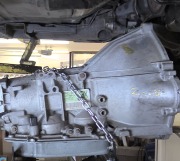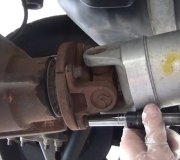Check with the place you bought the car from about a warranty. All the reputable new and used-car dealers in my city usually give a 30 day 50 / 50 warranty where you pay half the bill and they cover the other half. Problems like these pop up all the time and it is just bad luck that you bought the car right before that problem was about to occur. The dealer has know way of knowing that, but they offer the warranty to take the sting out of unexpected things like this. We do have one well-known crook who owns multiple new-car dealerships. He has figured out all kinds of ways to rip customers off. In this case he would give you an estimate for $4800.00, but he would start the conversation with, "good news, ... We're going to pay for half of the repair. All you'll have to pay is $2400.00".
$2400.00 is a pretty good price for a rebuilt transmission, but I'm still not convinced it needs to be replaced, at least right now. When the dealer covers half the bill, they aren't really shelling out any money. In this case their actual cost would be around $1200.00 or maybe a little more. Basically the parts get paid for and the mechanic gets his wages out of the $1200.00 you would pay. The dealer doesn't make any profit. He loses the profit he could have earned from his mechanic working on another customer's car. Also, he still has the huge number of bills to cover related to keeping the doors open for business. When all of that is factored in, the business is losing money but they do that to try to help you out in gratitude for buying the car from them. This is also what some of the profit goes to cover from all the other cars they've been working on.
I think I would visit a transmission specialty shop for a second opinion first. Tell them you already had it checked but you value their opinion more. That shows you consider them to be your advocate, not your adversary. By nature, some people will go out of their way to make a competitor look over-priced or incompetent, so don't volunteer where it was checked unless they ask. Most competitors are still friends with each other and they try to help their friends whenever possible. Some of them might agree with the previous diagnosis without really looking deeper, just to make the other shop look good. Neither of those scenarios are uncommon or fraudulent, but knowing who looked at your car previously can sway the second mechanic's opinion or affect his comments. You want an impartial and honest opinion. You can even say, "I'll tell you who looked at it already after you give me your unbiased opinion. That removes any bias and prevents them from incorrectly agreeing with a shop they like or incorrectly cutting down a competitor they don't like.
Also be aware transmission shops are in the business of rebuilding transmissions, so that's what they're going to lean towards. There could be a case where they might know all yours needs is a new filter, but based on other tests they know another failure is going to occur in about two years. They can hope you come back in two years instead of going to some other shop, or they can take care of the current and future problems right now by selling you the rebuild. They could also be inclined to just sell you the filter and fluid change, as long as they're fairly confident that will solve the problem, because they know you will remember how much money they saved you and you'll come back in the future. That's how good business people build a strong customer base and look to the future. That's exactly the opposite of how General Motors approaches their business practices.
One last comment about computer-controlled transmissions, which it appears you have since it produced a diagnostic fault code. Chrysler introduced that design for 1989 models, then everyone else copied it years later. With their system, the mechanic can read a set of four numbers on the scanner called the "clutch volume index", (CVI). Those show the number of ccs of fluid it takes to apply each of the four clutch packs. As the clutch plates wear down, it takes more fluid to fill in behind them when applying the pressure. The computer tracks that volume and keeps updating the shift schedules to maintain that nice solid, crisp shift it had when it was new. An experienced transmission mechanic can tell by those numbers how much wear has taken place. They can't tell you how many miles or years are left because everyone drives differently, but they can tell you the approximate percentage of life that is left in the most worn clutch pack. If those numbers are low yet, that says clutch plate wear is not the cause of the engine runaway and a filter and fluid change may be all that's needed. If the numbers are high, replacing just the filter may solve the problem for a little while but it's not a good value if it will still need to be rebuilt soon. Mechanics are typically concerned with what's best for you and your car long-term, not just solving the immediate problem.
SPONSORED LINKS
Tuesday, October 1st, 2013 AT 7:21 PM



